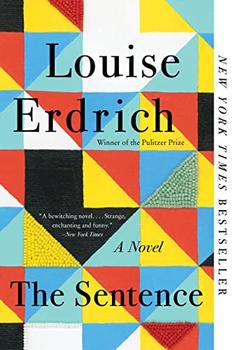Summary | Excerpt | Reviews | Beyond the book | Read-Alikes | Genres & Themes | Author Bio

Tookie, the middle-aged Ojibwe bookseller and ex-convict who serves as first-person narrator in Louise Erdrich's The Sentence, tells a story bursting with bizarre but smoothly related details. She begins with her theft of a dead body — that of the former lover of her friend and crush, Danae, a woman who offers our protagonist a large amount of money to retrieve this erstwhile paramour's corpse from his wife. A confluence of bad luck translates the spontaneous mission into hefty prison time for Tookie: The body is, unbeknownst to her, loaded with crack cocaine; she transports it across state lines; and she uses a refrigerated truck, which makes her look guilty of attempting to harvest organs. Pollux, a tribal officer who is Tookie's "Potawatomi conscience" and "alternate crush," explains these details before arresting her. After Tookie serves seven years, the two meet again on the streets of Minneapolis, he proposes to her and they marry.
Tookie tells the reader in these first strange pages that she enjoys lying, has a history of excessive drinking and drug use, and hallucinates. Yet this very tendency towards naked confession makes one want to trust her. So when she explains the goings-on at Birchbark Books, a store specializing in Indigenous literature owned by Erdrich herself (see Beyond the Book); how it is being haunted by Flora, an annoying deceased customer who imposed on the Native employees with her spurious claims of Indigenous ancestry; it is easy not only to sympathize with Tookie but to feel her dread at the otherworldly presence. She is convinced that it was reading a particular sentence in a book — a handwritten historical account detailing the experiences of a Native woman — that killed Flora, and subsequently becomes obsessed with avoiding the same fate. The Sentence, the title of which refers both to Tookie's prescribed prison time and the words she believes brought on Flora's doom, is built around this intriguing quasi-horror plot.
It also incorporates current events, including COVID-19 and the killing of George Floyd in Minneapolis, after which Tookie's relationship with her husband is tested by her feelings about police and government authority that emerge in reaction to the protests in the area. Tookie's political concerns merge with her seeming inability to shake Flora, subtly raising the question of how people can rid the world of racism and oppression when it takes on the qualities of a ghost or a disease, something that seeks to invade and possess, of how such a persistent and determined presence can be overcome.
The book's wider focus seems engineered to suit Tookie rather than the other way around. She is also a persistent and determined presence; even her own sense of herself is overwhelming. "There was just too much of me, the way there always has been," she says. "I am, and will always be, too much Tookie." But despite this, and despite her declaration that she is "ugly" inside and out, she is beautiful in her unrelenting intensity, someone who is continually seeking love. A subplot concerns her feelings of motherly devotion for Pollux's niece Hetta, a girl whose impulsive tendencies mirror Tookie's own inclinations, and Hetta's infant son Jarvis.
Tookie recounts how she developed a fondness for soups from various international locations after her release from prison: "Avgolemono. Sambar. Menudo. Egusi with fufu. Ajiaco. Borscht. Leberknödel suppe. Gazpacho. Tom yam. Solyanka. Nässelsoppa. Gumbo. Gamjaguk. Miso. Pho ga. Samgyetang." This simple, gorgeous list highlights both her love for language and the hunger she carries for the entire world after being shut away from it for so long. And in typical Tookie fashion, she follows up with a funny anecdote, one about overhearing men in a café ordering bull penis soup and trying to order it herself, at which point "the waiter looked sad and said they only got one penis a week and the soup went fast."
It is Tookie's too-muchness — her omnivorous appetites, her talent for storytelling and selling and embellishing — that makes her vulnerable and also ultimately saves her. Similarly, this brilliant novel thrives as a mish-mash of ghost story, mystery, comedy, picaresque, social commentary and book-lover's book, all of which is exactly enough. Through plumbing all these elements, Erdrich steers her complicated character towards a fitting conclusion, one that gives her a place in the vast world she loves without taking anything from her, one that allows her to make peace with herself and her ghost.
![]() This review was originally published in The BookBrowse Review in November 2021, and has been updated for the
September 2022 edition.
Click here to go to this issue.
This review was originally published in The BookBrowse Review in November 2021, and has been updated for the
September 2022 edition.
Click here to go to this issue.

If you liked The Sentence, try these:

by Louise Erdrich
Published 2025
In this stunning novel, Pulitzer Prize and National Book Award–winning author Louise Erdrich tells a story of love, natural forces, spiritual yearnings, and the tragic impact of uncontrollable circumstances on ordinary people's lives.

by Kaveh Akbar
Published 2024
A newly sober, orphaned son of Iranian immigrants, guided by the voices of artists, poets, and kings, embarks on a remarkable search for a family secret that leads him to a terminally ill painter living out her final days in the Brooklyn Museum. Electrifying, funny, and wholly original, Martyr! heralds the arrival of an essential new voice in ...
Your guide toexceptional books
BookBrowse seeks out and recommends the best in contemporary fiction and nonfiction—books that not only engage and entertain but also deepen our understanding of ourselves and the world around us.